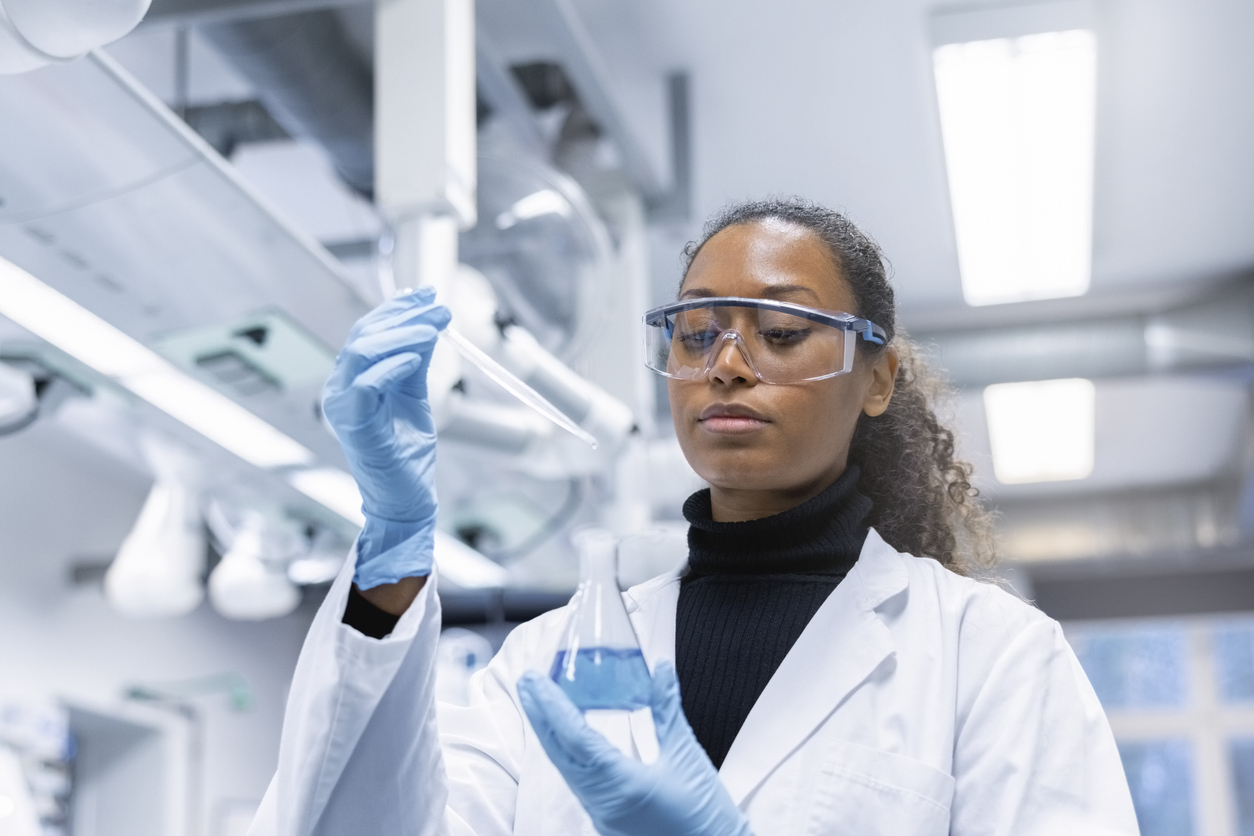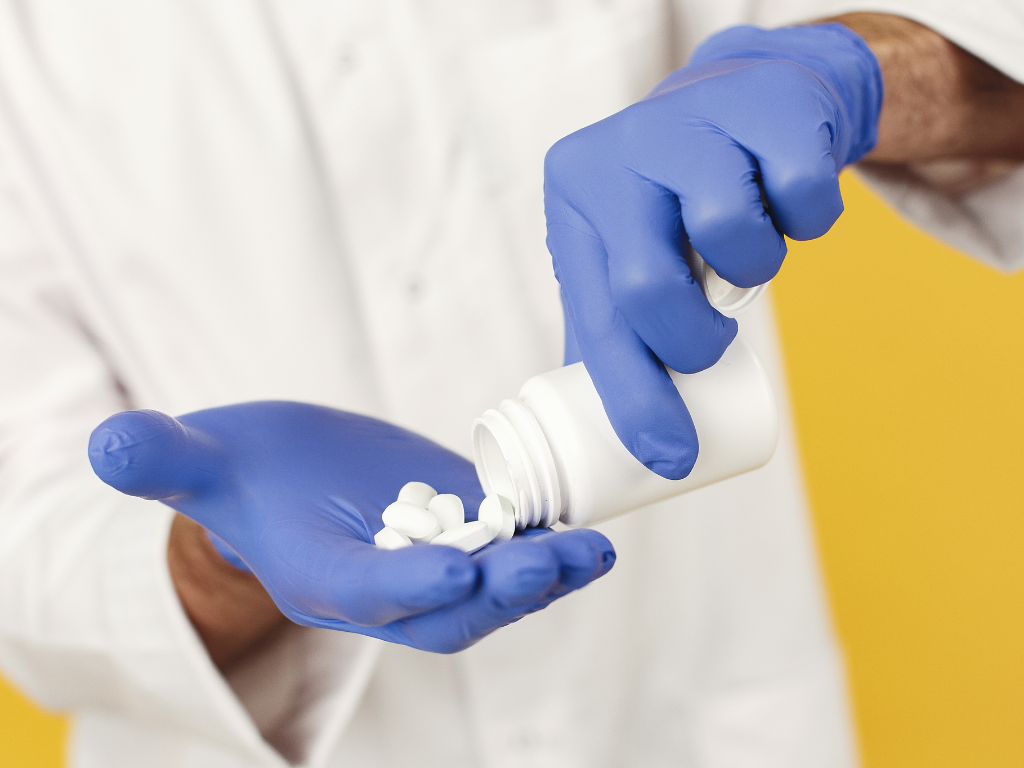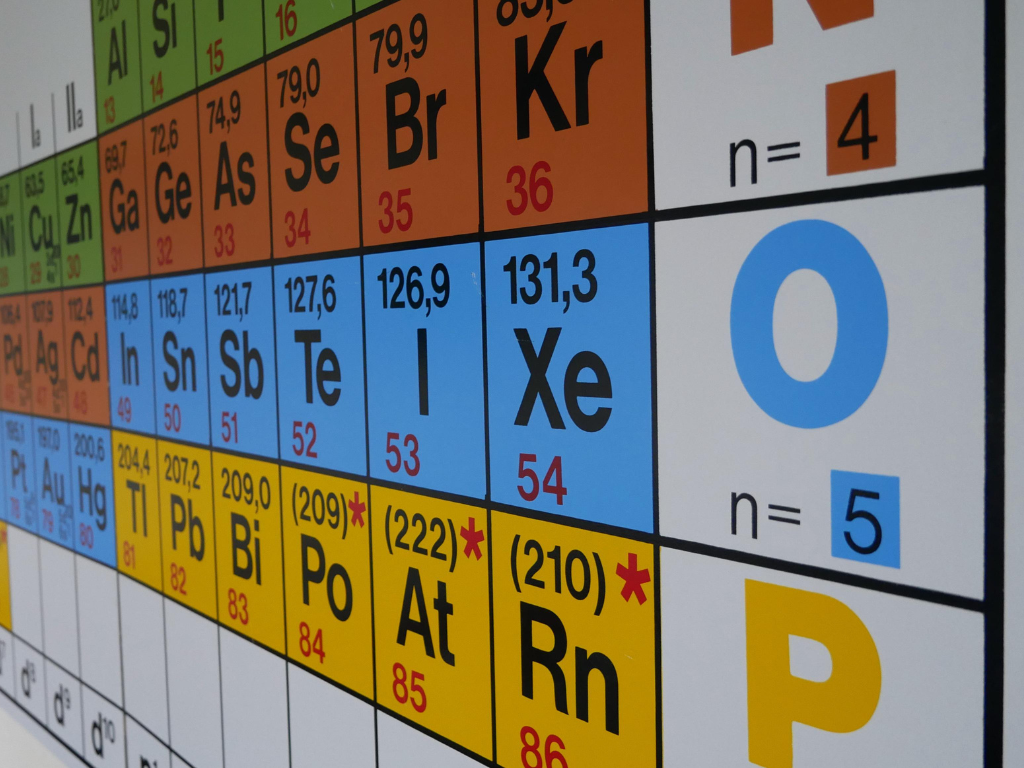Mission Statement
Recognizing the increasing importance of chemistry both as an area of liberal arts education and as a professional field, the Department of Chemistry offers courses to serve two types of students:
Those who want some fundamental knowledge of chemistry as a part of their general education
Those who need specific training in chemistry in preparation for professional careers in health, engineering, secondary education and chemistry.
Student Learning Outcomes
Students will demonstrate an understanding of major concepts, theoretical principles and experimental findings in chemistry. They will be able to employ critical thinking and efficient problem-solving skills in the four basic areas of chemistry (analytical, inorganic, organic, and physical). The bachelor's degree in chemistry from Tougaloo College will train students to work effectively in diverse teams in both classroom and laboratory, to effectively write and communicate, to conduct experiments using modern instrumentation for chemical analysis and separation, analyze data, and interpret results, while observing responsible and ethical scientific conduct. This will enable students to gain entry into professional schools, graduate programs, or the job market.
Academic Programs
The Department of Chemistry offers comprehensive programs from associate degrees to advanced bachelor's degrees, designed to meet diverse career goals in chemistry, health professions, and education.

Chemistry, B.S.
Comprehensive program covering all major areas of chemistry including physical chemistry, advanced laboratory techniques, and research experience. Prepares students for graduate school and professional careers.

Chemistry for Health Professionals, B.S.
Specialized program designed for students pursuing health-related professions, with emphasis on biochemistry, biophysical chemistry, and medical applications.

Chemistry Pre-Pharmacy, A.A.
Two-year associate degree program providing foundational chemistry and science courses required for pharmacy school admission.

Chemistry Minor
Complementary program for students majoring in other fields who want to strengthen their scientific background with fundamental chemistry knowledge.
Career Opportunities
Chemistry graduates from Tougaloo College are well-prepared for diverse career paths in industry, healthcare, education, and research. Our comprehensive training provides the analytical and problem-solving skills valued across many sectors.
Healthcare & Pharmaceuticals
- Pharmacist
- Medical Laboratory Technologist
- Clinical Research Associate
- Pharmaceutical Sales Representative
- Drug Development Scientist
- Toxicologist
- Medical School (Pre-med)
- Physician Assistant
Research & Development
- Research Chemist
- Analytical Chemist
- Materials Scientist
- Biochemist
- Quality Control Analyst
- Product Development Chemist
- Graduate School Researcher
- University Professor
Industry & Manufacturing
- Process Chemist
- Chemical Engineer
- Environmental Chemist
- Food Scientist
- Forensic Scientist
- Patent Attorney (with law degree)
- Technical Sales Specialist
- Production Manager
Education & Government
- High School Chemistry Teacher
- Science Curriculum Developer
- Science Museum Educator
- EPA Scientist
- FDA Inspector
- Criminal Investigator
- Science Writer
- Laboratory Manager

Academic Programs
Our chemistry programs provide comprehensive training in theoretical concepts, laboratory techniques, and research methods essential for success in chemistry and related fields.
Choose from our degree programs, each designed to meet specific career goals and academic interests:
Chemistry, B.S.
Required Courses (54 Credit Hours)
This course serves to introduce potential STEM majors to all of the disciplines housed within the School of Natural Sciences. Through team-teaching, students will be exposed to the fundamental concepts and applications of computer science, mathematics, chemistry, physics, and biology.
CREDIT: 2 SEMESTER HOUR(S)
These are introductory courses in the principles of chemistry. Topics include the mole concept, stoichiometry, states of matter, thermodynamics, chemical bonding, equilibria, kinetics, acid-base reactions, and oxidation-reduction reactions.
CREDIT: 3 SEMESTER HOUR(S)
Prerequisite(s): Math ACT score 20 or CHE 104 with a grade of C
Corequisite(s): CHE 117, MAT 103 or MAT 104 or MAT 221
Continuation of CHE 115. These are introductory courses in the principles of chemistry.
CREDIT: 3 SEMESTER HOUR(S)
Prerequisite(s): CHE 115 with grade of C
Corequisite(s): MAT 104 or MAT 221 and CHE 118
These are introductory laboratory courses to demonstrate, clarify, and develop experimentally the principles of chemistry taught in CHE 115-CHE 116.
CREDIT: 1 SEMESTER HOUR(S)
Corequisite(s): CHE 115
These are introductory laboratory courses to demonstrate, clarify, and develop experimentally the principles of chemistry taught in CHE 115-CHE 116.
CREDIT: 1 SEMESTER HOUR(S)
Corequisite(s): CHE 116
These courses provide an introduction to the chemistry of carbon compounds. Organic structures and functional groups, stereochemistry and conformational analysis, kinetics, important organic reactions and their mechanisms and their use in organic synthesis are discussed.
CREDIT: 3 SEMESTER HOUR(S)
Prerequisite(s): CHE 116 with C or better grade
Continuation of CHE 225. Advanced topics in organic chemistry.
CREDIT: 3 SEMESTER HOUR(S)
Prerequisite(s): CHE 225 with C or better grade
This is an introductory laboratory course that includes techniques and methods used in synthesis, separation, and purification. IR spectroscopy, thin-layer and column and gas chromatography methods are studied.
CREDIT: 1 SEMESTER HOUR(S)
Corequisite(s): CHE 225
This is a course discussing the theory and use of IR, NMR, and mass spectrometry; strategies of multistep synthesis; and methods of organic structure determination.
CREDIT: 1 SEMESTER HOUR(S)
Prerequisite(s): CHE 227 with a grade of C or above
Corequisite(s): CHE 226
This is a course to learn the theoretical understanding of techniques used in analytical chemistry. Course will include gravimetric analysis, titration, spectrophotometry, chromatography and electrochemical analysis.
CREDIT: 2 SEMESTER HOUR(S)
Prerequisite(s): CHE 116 and CHE 118 with grade of C or higher
Corequisite(s): CHE 233
This is a laboratory course to learn experimental techniques of analytical chemistry taught in CHE 231.
CREDIT: 2 SEMESTER HOUR(S)
Corequisite(s): CHE 231
These courses provide a study of theoretical chemistry based on selected topics such as states of matter, atomic and molecular forces, quantum theory, chemical bonding, statistical mechanics, physical properties and structures, kinetics, thermodynamics, properties of solutions, and electrochemistry.
CREDIT: 3 SEMESTER HOUR(S)
Prerequisite(s): CHE 116, MAT 321 and PHY 224
Continuation of CHE 333. Advanced physical chemistry topics.
CREDIT: 3 SEMESTER HOUR(S)
Prerequisite(s): CHE 333
This is a laboratory course designed to elucidate principles of physical chemistry and to introduce students to physical measurements encountered in chemical research. This course serves to fulfill the requirement for the junior/senior-level writing intensive course.
CREDIT: 2 SEMESTER HOUR(S)
Corequisite(s): CHE 333
Continuation of CHE 337. Advanced physical chemistry laboratory techniques.
CREDIT: 2 SEMESTER HOUR(S)
Corequisite(s): CHE 334
This course aims to provide students with a modern view of the chemistry of inorganic molecules and solids. The material will include the wave-mechanical description of atoms, molecules, and solids; structure and bonding in metals and ionic compounds; chemistry in nonaqueous solvents.
CREDIT: 3 SEMESTER HOUR(S)
Prerequisite(s): CHE 116
Students are required to conduct an original literature search. Students present a seminar on their reading and understanding of the material. Students are required to complete a senior paper.
CREDIT: 1 SEMESTER HOUR(S)
Continuation of CHE 461. Students present a seminar on their reading and understanding of the material.
CREDIT: 1 SEMESTER HOUR(S)
This course examines polar coordinates, parametric equations, arc lengths, vector calculus, curvature, surface area, functions of several variables, partial derivative, gradient. Offered every fall.
CREDIT: 3 SEMESTER HOUR(S)
Prerequisite(s): MAT 222 with a minimum grade of “C.”
This one-semester course will employ calculus in the study of key components of Newtonian Mechanics including Fluid Mechanics and Gravitation. Offered every spring. Three hours of lecture and problem solving per week. Three-hour laboratory period per week.
CREDIT: 4 SEMESTER HOUR(S)
Prerequisite(s): MAT 221 or PHY 111
This one-semester course will employ calculus in the study of Oscillations and Waves, Electricity, and Magnetism. Offered every fall. Three hours of lecture and problem solving per week. Three-hour laboratory period per week.
CREDIT: 4 SEMESTER HOUR(S)
Prerequisite(s): MAT 222 and PHY 223
Required Elective (4 Credit Hours)
Student must choose one course from the following:
The course covers structure and functions of the living cell and the subcellular particles. Chemistry of metabolism and biological function of proteins, nucleic acids, carbohydrates, lipids, enzymes and coenzymes are discussed in detail.
CREDIT: 3 SEMESTER HOUR(S)
Prerequisite(s): CHE 226
Co-listed As: BIO 412
This laboratory course provides a background in the methods and principles involved in the isolation, analysis, and functioning of the enzymes, biochemical materials, and cellular organelles.
CREDIT: 1 SEMESTER HOUR(S)
Prerequisite(s): CHE 226, CHE 228
Corequisite(s): CHE 412
This is an introduction to electronics and principles of chemical instrumentation used in spectroscopy, mass spectroscopy, electrochemistry, and chromatography.
CREDIT: 4 SEMESTER HOUR(S)
Prerequisite(s): CHE 231
Chemistry for Health Professionals, B.S.
In addition to the regular Bachelor of Science Degree in Chemistry, the Department of Chemistry also offers a Bachelor of Science Degree in Chemistry for Health Professionals. This degree seeks to serve students who intend to pursue a health-related profession.
Required Chemistry Courses (31 Credit Hours)
These are introductory courses in the principles of chemistry. Topics include the mole concept, stoichiometry, states of matter, thermodynamics, chemical bonding, equilibria, kinetics, acid-base reactions, and oxidation-reduction reactions.
CREDIT: 3 SEMESTER HOUR(S)
Prerequisite(s): Math ACT score 20 or CHE 104 with a grade of C
Continuation of CHE 115.
CREDIT: 3 SEMESTER HOUR(S)
Prerequisite(s): CHE 115 with grade of C
Laboratory courses accompanying general chemistry.
CREDIT: 1 SEMESTER HOUR(S) each
These courses provide an introduction to the chemistry of carbon compounds. Organic structures and functional groups, stereochemistry and conformational analysis, kinetics, important organic reactions and their mechanisms.
CREDIT: 3 SEMESTER HOUR(S) each
Prerequisite(s): CHE 116 with C or better grade
These courses provide an introduction to the chemistry of carbon compounds. Organic structures and functional groups, stereochemistry and conformational analysis, kinetics, important organic reactions and their mechanisms.
CREDIT: 3 SEMESTER HOUR(S) each
Prerequisite(s): CHE 225 with C or better grade.
Laboratory courses covering synthesis, separation, purification, IR spectroscopy, NMR, and mass spectrometry.
CREDIT: 1 SEMESTER HOUR
Corequisite(s): CHE 225
Laboratory courses covering synthesis, separation, purification, IR spectroscopy, NMR, and mass spectrometry.
CREDIT: 1 SEMESTER HOUR Prerequisite(s): CHE 227 with a grade of C or above.
Corequisite(s): CHE 226
This is a course to learn the theoretical understanding of techniques used in analytical chemistry. Course will include gravimetric analysis, titration, spectrophotometry, chromatography and electrochemical analysis. Two hours of lecture per week.
CREDIT: 2 SEMESTER HOUR(S) each Prerequisite(s): CHE 116 and CHE 118 with grade of C or higher.
Corequisite(s): CHE 233
This is a course to learn the theoretical understanding of techniques used in analytical chemistry. Course will include gravimetric analysis, titration, spectrophotometry, chromatography and electrochemical analysis. Two hours of lecture per week.
CREDIT: 2 SEMESTER HOUR(S) each Prerequisite(s): CHE 116 and CHE 118 with grade of C or higher.
Corequisite(s): CHE 231
A course to introduce fundamental concepts of physical chemistry and how the concepts can be used to understand biological processes. Topics include classical thermodynamics, statistical thermodynamics kinetics, electrochemistry and quantum mechanics, with emphasis on applications to biological systems.
CREDIT: 3 SEMESTER HOUR(S)
Prerequisite(s): CHE 412, MAT 222
A laboratory course used to explicate the fundamental approaches by physical chemists to understand the behavior of biological processes.
CREDIT: 2 SEMESTER HOUR(S)
Corequisite(s): CHE 443
The course covers structure and functions of the living cell and the subcellular particles. Chemistry of metabolism and biological function of proteins, nucleic acids, carbohydrates, lipids, enzymes and coenzymes.
CREDIT: 3 SEMESTER HOUR
Prerequisite(s): CHE 226
This laboratory course provides background in methods and principles involved in isolation, analysis, and functioning of enzymes, biochemical materials, and cellular organelles.
CREDIT: 1 SEMESTER HOUR(
Prerequisite(s): CHE 226, CHE 228
Students are required to conduct an original literature search. Students present a seminar on their reading and understanding of the material. One hour of discussion per week. Students are required to complete a senior paper. They are also required to take the Major Field Test for Chemistry. Offered in the fall.
CREDIT: 1 SEMESTER HOUR
Students are required to conduct an original literature search. Students present a seminar on their reading and understanding of the material. One hour of discussion per week. Students are required to complete a senior paper. They are also required to take the Major Field Test for Chemistry. Offered in the spring.
CREDIT: 1 SEMESTER HOUR
Other Required Courses (27 Credit Hours)
This course provides a comprehensive treatment of the major principles of modern biology. Topics include cell structure, cell membrane, metabolism, cellular respiration, cell cycle/mitosis, Mendelian genetics, DNA structure and replication, and protein synthesis.
CREDIT: 4 SEMESTER HOUR(S)
Prerequisite(s): MAT 103
This is a continuation of BIO 111 and comprehensive treatment of major principles of modern biology. Topics include evolution, photosynthesis, plant structure/growth/transport/nutrition/reproduction, and animal systems.
CREDIT: 4 SEMESTER HOUR(S)
Prerequisite(s): BIO 111
This course is a study of the morphology and physiology of cells and cell organelles; diversity of cell types resulting from cell specialization; mechanisms by which cells reproduce, develop, and evolve.
CREDIT: 4 SEMESTER HOUR(S)
Prerequisite(s): BIO 112, CHE 115 or consent of instructor
Upper-level biology elective course.
CREDIT: 4 SEMESTER HOUR(S)
This course is a study of real numbers, functions, limits continuity, differentiation, application of derivative, Rolle's Theorem, Mean Value Theorem, anti-derivatives, the definite integral.
CREDIT: 3 SEMESTER HOUR(S)
Prerequisite(s): MAT 104 or MAT 105 with a minimum grade of "C"
Physics I Requirements
Students must select one of the following course options.
This course is a basic study of the principles of physics for science majors and for non-science majors with good mathematics backgrounds. Topics covered without the use of calculus include space, time and motion, optics and waves, mechanics, heat, electricity and magnetism, and modern physics. Offered every fall. Three hours of lecture and problem solving per week. Three hours of laboratory per week.
CREDIT: 4 SEMESTER HOUR(S)
Corequisite(s): MAT 103, MAT 104, or MAT 105 (to replace MAT 103, MAT 104) or consent of the instructor.
This one-semester course will employ calculus in the study of key components of Newtonian Mechanics including Fluid Mechanics and Gravitation. Offered every spring. Three hours of lecture and problem solving per week. Three-hour laboratory period per week.
CREDIT: 4 SEMESTER HOUR(S)
Prerequisite(s): MAT 221 or PHY 111
Physics II Requirements
Students must select one of the following course options.
This course is a basic study of the principles of physics for science majors and for non-science majors with good mathematics backgrounds. Topics covered without the use of calculus include space, time and motion, optics and waves, mechanics, heat, electricity and magnetism, and modern physics. Offered every spring. Three hours of lecture and problem solving per week. Three hours of laboratory per week.
CREDIT: 4 SEMESTER HOUR(S)
Corequisite(s): MAT 103, MAT 104, or MAT 105 (to replace MAT 103, 104) or consent of the instructor.
This one-semester course will employ calculus in the study of Oscillations and Waves, Electricity, and Magnetism. Offered every fall. Three hours of lecture and problem solving per week. Three-hour laboratory period per week.
CREDIT: 4 SEMESTER HOUR(S)
Prerequisite(s): MAT 222 and PHY 223
Elective Requirements
This is an advanced course designed to introduce students to material not covered in other courses. The content and structure of the course are flexible and are decided by the faculty and students. Offered as staffing permits.
CREDIT: TO BE ARRANGED SEMESTER HOUR(S)
This is an introduction to electronics and principles of chemical instrumentation used in spectroscopy, mass spectroscopy, electrochemistry, and chromatography.
CREDIT: 4 SEMESTER HOUR(S)
Prerequisite(s): CHE 231
The fundamental Theorem of Calculus, areas, volumes, arc lengths, work, and pressure are examined in this course.
CREDIT: 3 SEMESTER HOUR(S)
Prerequisite(s): MAT 221 with minimum grade of "C"
This course focuses on preparing students for the Physics course sequence. Topics covered are scientific notations and symbols, physical parameters/observables, their functional dependencies.
CREDIT: 3 SEMESTER HOUR(S)
Prerequisite(s): MAT 103
This course will cover the analysis of Thermodynamics, Optics, and Quantum Physics at a basic foundational level using algebra and calculus.
CREDIT: 4 SEMESTER HOUR(S)
Prerequisite(s): PHY 224
Chemistry Pre-Pharmacy, A.A.
Required Chemistry Pre-Pharmacy Courses (20 Credit Hours)
This course is a study of the anatomy and physiology of the human body as an integrated whole with more detailed studies of the skeletal, muscular, and nervous systems.
CREDIT: 4 SEMESTER HOUR(S)
Corequisite(s): MAT 103 and ACT score of 21 or consent of instructor
These are introductory courses in the principles of chemistry. Topics include the mole concept, stoichiometry, states of matter, thermodynamics, chemical bonding, equilibria, kinetics, acid-base reactions, and oxidation-reduction reactions.
CREDIT: 3 SEMESTER HOUR(S)
Prerequisite(s): Math ACT score 20 or CHE 104 with a grade of C
Continuation of CHE 115.
CREDIT: 3 SEMESTER HOUR(S)
Prerequisite(s): CHE 115 with grade of C
These are introductory laboratory courses to demonstrate, clarify, and develop experimentally the principles of chemistry taught in CHE 115-CHE 116. One three-hour laboratory per week.
CREDIT: 1 SEMESTER HOUR(S) each
Corequisite(s): CHE 115
These are introductory laboratory courses to demonstrate, clarify, and develop experimentally the principles of chemistry.
CREDIT: 1 SEMESTER HOUR(S) each
Corequisite(s): CHE 116
These courses provide an introduction to the chemistry of carbon compounds. Organic structures and functional groups, stereochemistry and conformational analysis, kinetics, important organic reactions and their mechanisms.
CREDIT: 3 SEMESTER HOUR(S)
Prerequisite(s): CHE 116 with C or better grade
This is an introductory laboratory course that includes techniques and methods used in synthesis, separation, and purification.
CREDIT: 1 SEMESTER HOUR(S)
Corequisite(s): CHE 225
Physics I Requirements
Students must select one of the following course options.
This course is a basic study of the principles of physics for science majors and for non-science majors with good mathematics backgrounds. Topics covered without the use of calculus include space, time and motion, optics and waves, mechanics, heat, electricity and magnetism, and modern physics. Offered every fall. Three hours of lecture and problem solving per week. Three hours of laboratory per week.
CREDIT: 4 SEMESTER HOUR(S)
Corequisite(s): MAT 103, MAT 104, or MAT 105 (to replace MAT 103, MAT 104) or consent of the instructor.
This one-semester course will employ calculus in the study of key components of Newtonian Mechanics including Fluid Mechanics and Gravitation. Offered every spring. Three hours of lecture and problem solving per week. Three-hour laboratory period per week.
CREDIT: 4 SEMESTER HOUR(S)
Prerequisite(s): MAT 221 or PHY 111
Electives (Select 6-8 Credit Hours)
Comprehensive treatment of major principles of modern biology.
CREDIT: 4 SEMESTER HOUR(S)
Prerequisite(s): MAT 103
Continuation of BIO 111.
CREDIT: 4 SEMESTER HOUR(S)
Prerequisite(s): BIO 111
Continuation of Human Anatomy and Physiology I in which the circulatory, respiratory, digestive, urinary, reproductive, and endocrine systems are studied.
CREDIT: 4 SEMESTER HOUR(S)
Prerequisite(s): BIO 111 or BIO 115, or consent of instructor
This course introduces the structure and function of microorganisms with special emphasis on bacteria and viruses.
CREDIT: 4 SEMESTER HOUR(S)
Prerequisite(s): BIO 112 or BIO 115 and BIO 116
These courses provide an introduction to the chemistry of carbon compounds. Organic structures and functional groups, stereochemistry and conformational analysis, kinetics, important organic reactions and their mechanisms.
CREDIT: 3 SEMESTER HOUR(S) each
Prerequisite(s): CHE 225 with C or better grade.
Laboratory courses covering synthesis, separation, purification, IR spectroscopy, NMR, and mass spectrometry.
CREDIT: 1 SEMESTER HOUR Prerequisite(s): CHE 227 with a grade of C or above.
Corequisite(s): CHE 226
This course is designed as a basic introductory course in economics. The course introduces and covers basic concepts of economic theory such as demand and supply, national income, economic growth, interest, inflation, business cycle, unemployment, and fiscal and monetary policy. The course also discusses macroeconomic policy and current economic events. Offered every fall.
CREDIT: 3 SEMESTER HOUR(S)
Prerequisite(s): MAT 103 and ENG 102
This course explores applications of statistics to the biological sciences. Topics may include data analysis, confidence intervals, significance, and the uses of statistics in such areas as epidemiology and clinical practice. Offered every spring.
CREDIT: 3 SEMESTER HOUR(S)
Prerequisite(s): MAT 103 with a grade of “C.”
This course is an introduction to the principles of behavior. This course represents a comprehensive overview of major theoretical areas of study within the field of psychology. Focus is placed on the scientific and experimental aspects of psychological thinking, brain and behavior, human development, consciousness, conditioning and learning, memory, cognition, language, creativity, intelligence, and gender and sexuality. Offered every fall and spring semester.
CREDIT: 3 SEMESTER HOUR(S)
Prerequisite(s): ENG 101
This course is an introduction to the principles of behavior. This course represents a comprehensive overview of major applied areas of study within the field. Focus is placed on sensation and perception, motivation and emotion, personality, health, stress and coping, psychological disorders, therapies, social thinking and social influence, pro-social and antisocial behavior, and applied psychology. Offered every fall and spring semester.
CREDIT: 3 SEMESTER HOUR(S)
Prerequisite(s): ENG 101
This course introduces the basic principles and concepts of sociology and examination of the elements of social structure and social behavior. Focus is placed on the fundamental structure of American society and the basic changes occurring in recent years, with tentative projections into the future. This course is a prerequisite for all required courses in the Sociology major. Offered each semester.
CREDIT: 3 SEMESTER HOUR(S)
This course is an introduction to the foundations of statistical thinking and exploratory data analysis. This course is designed to help students acquire fundamental skills in organizing, displaying, reading, and interpreting data including the use of standard computer software, such as the BIDP package to analyze their data. The computer analytic skills are taught in a two-hour computer applications lab which meets once a week. Offered every fall; this course is required of all majors within the School of Social Sciences.
CREDIT: 3 SEMESTER HOUR(S)
Prerequisite(s): MAT 103, or MAT 106, or advanced level math with a “C” average.
Chemistry Minor
The Chemistry minor is open to all students that fulfill the requirements listed below. This minor provides valuable analytical and problem-solving skills for students in other disciplines.
Required Courses (20 Credit Hours)
These are introductory courses in the principles of chemistry. Topics include the mole concept, stoichiometry, states of matter, thermodynamics, chemical bonding, equilibria, kinetics, acid-base reactions, and oxidation-reduction reactions.
CREDIT: 3 SEMESTER HOUR(S)
Prerequisite(s): Math ACT score 20 or CHE 104 with a grade of C
Continuation of CHE 115.
CREDIT: 3 SEMESTER HOUR(S)
Prerequisite(s): CHE 115 with grade of C
These are introductory laboratory courses to demonstrate, clarify, and develop experimentally the principles of chemistry.
CREDIT: 1 SEMESTER HOUR(S)
Corequisite(s): CHE 115
Laboratory course accompanying CHE 116.
CREDIT: 1 SEMESTER HOUR(S)
Corequisite(s): CHE 116
These courses provide an introduction to the chemistry of carbon compounds. Organic structures and functional groups, stereochemistry and conformational analysis, kinetics, important organic reactions and their mechanisms.
CREDIT: 3 SEMESTER HOUR(S)
Prerequisite(s): CHE 116 with C or better grade
Continuation of CHE 225.
CREDIT: 3 SEMESTER HOUR(S)
Prerequisite(s): CHE 225 with C or better grade
This is an introductory laboratory course that includes techniques and methods used in synthesis, separation, and purification.
CREDIT: 1 SEMESTER HOUR(S)
Corequisite(s): CHE 225
This is a course discussing the theory and use of IR, NMR, and mass spectrometry; strategies of multistep synthesis; and methods of organic structure determination.
CREDIT: 1 SEMESTER HOUR(S)
Prerequisite(s): CHE 227 with a grade of C or above
This is a course to learn the theoretical understanding of techniques used in analytical chemistry. Course will include gravimetric analysis, titration, spectrophotometry, chromatography and electrochemical analysis.
CREDIT: 2 SEMESTER HOUR(S)
Prerequisite(s): CHE 116 and CHE 118 with grade of C or higher
This is a laboratory course to learn experimental techniques of analytical chemistry taught in CHE 231.
CREDIT: 2 SEMESTER HOUR(S)
Corequisite(s): CHE 231
Discover the Science Behind Everything
Join a department that combines rigorous scientific training with hands-on laboratory experience. Whether you're interested in healthcare, research, industry, or education, our chemistry programs provide the foundation for success in your chosen career.
